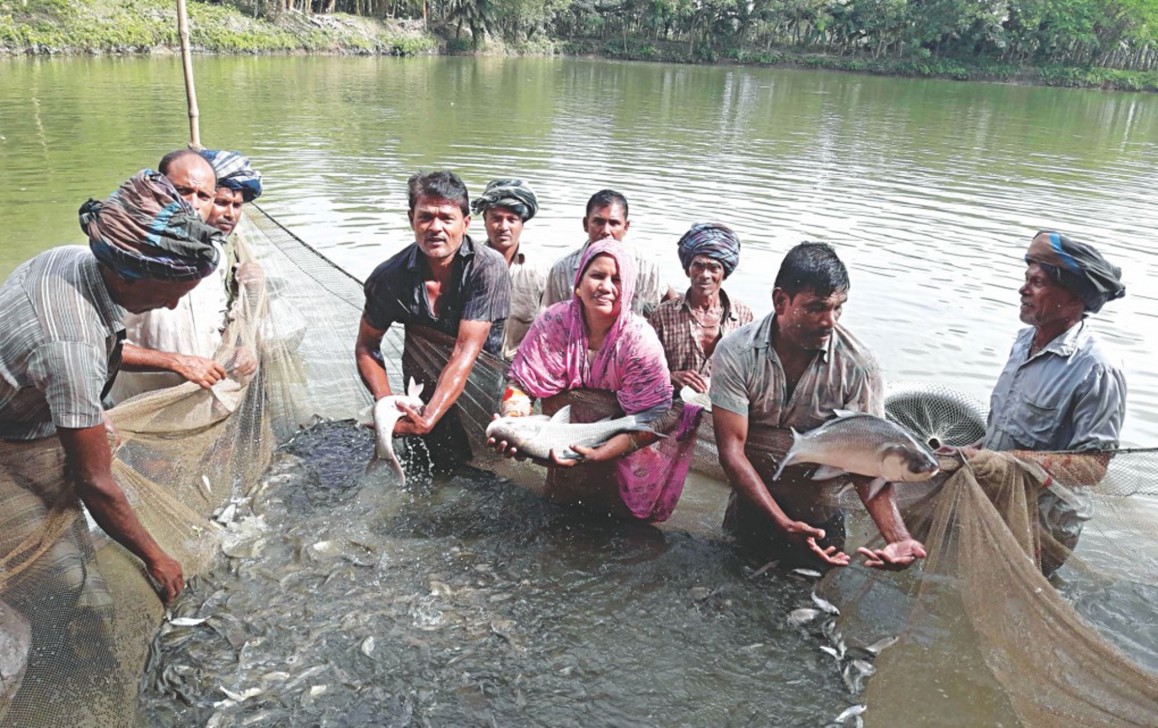Aquaculture in Bangladesh: Farming without plunder

Dhaka, 17 January, 2021: Aquaculture, or the farming of aquatic life such as molluscs, crustaceans and fish under controlled conditions, is a direct antithesis of commercial fishing which is often exploitative and destructive to natural ecosystems. By analysing the aquaculture industry of Bangladesh, the lessons learned can be applied to any society with a restorative approach that is accountable for vulnerable communities.
Oftentimes, thinking about complex concepts with elongated lexicon such as "regenerative agriculture" can feel pertinent only to the first world's struggle against climate change, as developing nations like Bangladesh have other challenges such as poverty to prioritise first.
However, Bangladesh is the sixth largest aquaculture producing country in the world, according to the Food and Agricultural Organization (FAO), with a marine catch of 455,601 tonnes and a total fish production of over two million tonnes. The culture of the subcontinent is heavily dependent on the ocean environment for livelihoods and for food, but because of rising sea levels due to global warming, these practices have been drastically changed, resulting in unbalanced natural systems for the environment and the loss of revenue for humans—not to mention individuals having to resort to unsustainable fishing practices such as the usage of nets and dredges, which is often done by multinational corporations with a lack of informed consent from the locals.
The main species that are cultured in closed waters through sustainable aquaculture are major and exotic carps, striped catfish (Pangasius hypophthalmus), tilapia and Java barbe (Barbonymus gonionotus). This process is carried out in the coastal regions of the country, mostly in Chattogram and Barishal, where only minimal inputs are used, if at all, for the natural recruitment of fish. Furthermore, a minuscule amount of artificial resources are used, as the ponds are filled by the heavy rains that descend upon the tropical torrid region from the natural regulation of the water cycle. Stocked fish are not specifically selected; the natural predators in the region are allowed to thrive to ensure that there is no singular disruption in the trophic levels of the marine food chain, and no fertilisers are distributed except organic ones, which in itself is a rare practice.
In recent years, the production of fish has increased after stricter regulations by the government on the limitations of commercial fishing. Although the practice of aquaculture was dying in favour of more cost-effective and profit earning methods involving mass aqua-farming and draining water bodies, there has been a surge in its popularity once more as the climate movement advances and people become more conscious of the environmental risks such practices pose, and as awareness spreads on the increases in production levels that these regenerative methods can bring to the industry.
The importance of aquaculture is undeniable not just in Bangladesh, but in every country of the world. One in seven people on earth rely on marine species as part of their diet and/or income. Unfortunately, to meet the demands of the increasing world population, more than 90 percent of the earth's fish caches are overfished or exhausted past their capacity—some examples being the bluefish tuna in the Mediterranean and wild salmon in the West Coast of the US.
A safer, regenerative alternative is aquaculture, which is also the fastest growing segment in agriculture as of today, presenting a major opportunity to meet the unemployment and food inequality challenges that Bangladesh and the rest of the world face while tackling the issue of preserving our fish species. The main challenge that researchers and blue collar workers alike are currently collaborating on internationally, is to make the practice permanent in the future through ensuring climate security and more efficient, urgent management of the world's biodiversity crisis.
The primary objective of most forms of farming—especially for rural farmers living in Bangladesh—is economic benefits, an influence that is undeniable when it comes to water management. In the planning stages of sustainable aquaculture, it is important to consider social and environmental viability to achieve a balanced system. Examples such as subsistence farming and integrated farming are social benefit oriented, and the two models often intersect to maximise output so that these families can have their livelihoods, while ensuring that the surrounding species are not endangered by overfishing. The complexity of management needs to be integrated into the environment that it is best suited for and ensure that it is not overburdened.
Interestingly, if implemented properly and with the right education and tools, aquaculture has the lowest environmental footprint out of all protein sources. The natural maintenance of various trophic levels and the water cycle ensure waste cycling without generating non-biodegradable remnants that large fishing nets, plastic, oil and other forms of commercial fishing equipment can leave. As the compost from aquaculture builds up in the designated seabed area over time, the output is also expected to increase along with the quality of the water in terms of sustaining life. So, this regenerative approach can be taken off the soil and into the waves.
The challenges faced by the country in fully integrating this approach is first and foremost, a lack of funds, and secondly, a lack of authoritative management. While the government has passed a few acts pertaining to the conservation of animal life, nothing specific has been done for marine diversity and the ethical management of these caches.
Samreen Mehak is a student at Bennington College, Vermont, USA.
Read More
.

